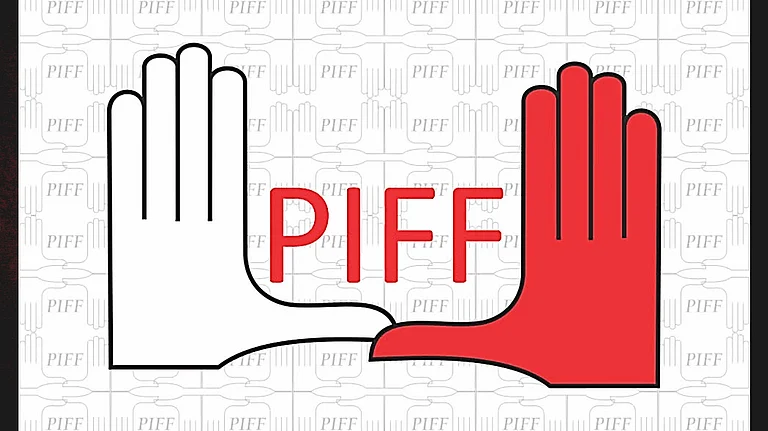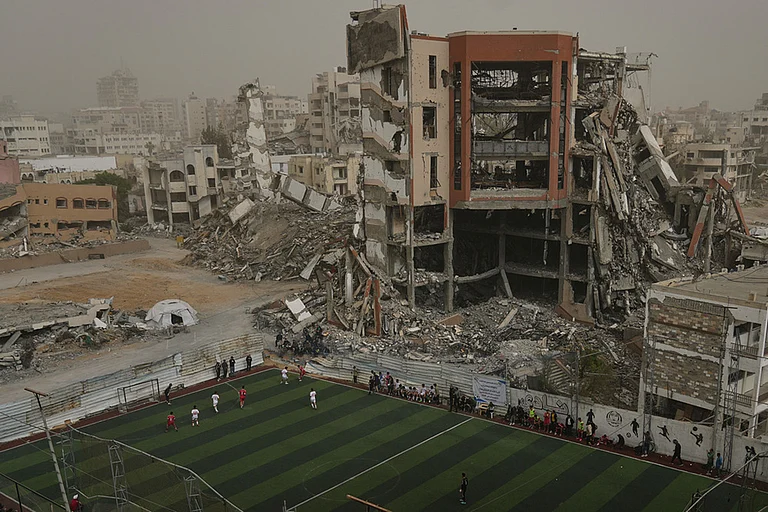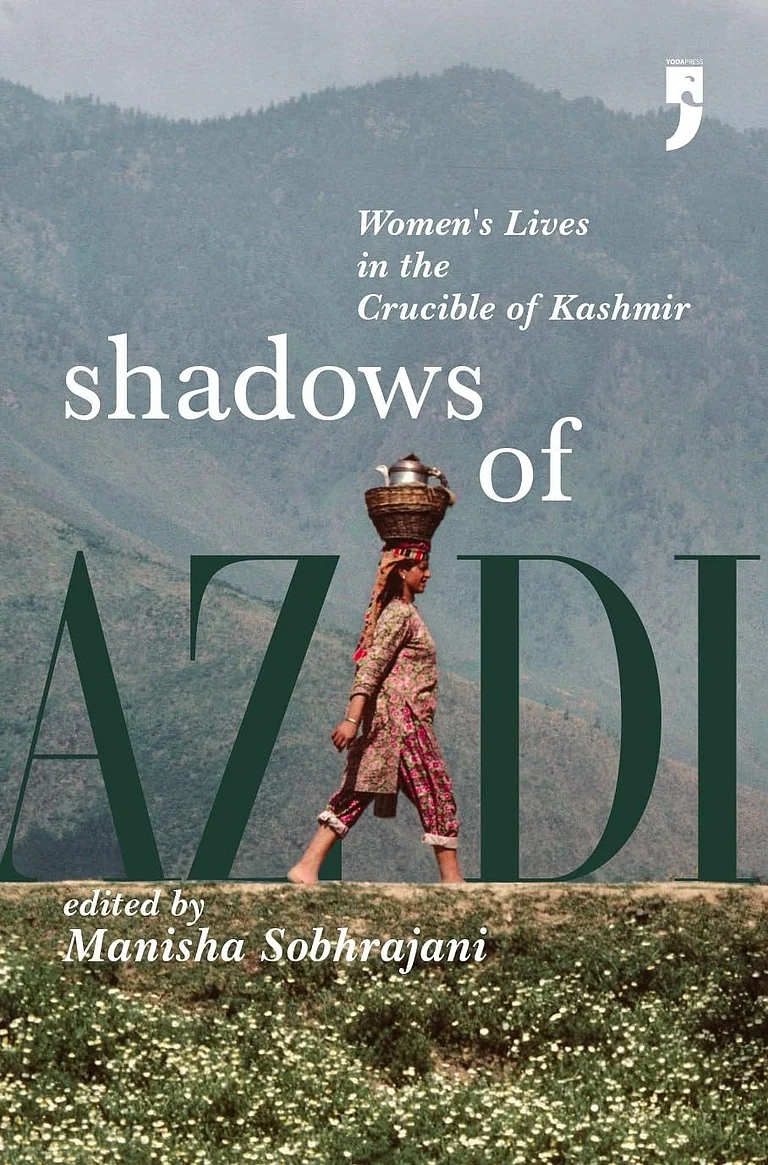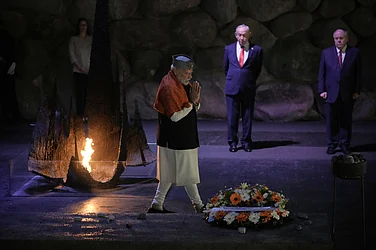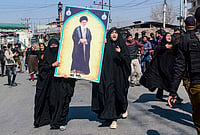That feeling has no name. When you are racing to finish work on a book because you don’t know what the fate of the author is going to be. Will they be around to see the book? And if they are, will you be able to get it across to them? Or will they have to be satisfied with only a WhatsApp photo of the book? Above all, how on earth are they coping?
In early October 2023, we at LeftWord Books were working on Haidar Eid’s book Decolonising the Palestinian Mind. My colleague Vijay Prashad was near finishing the first round of edits, after which the text would have gone back to the author. We’d have taken in his corrections and suggestions, done another round of editing, and sent it back. We were aiming to have the book out in January 2024.
Then, October 7. As the scale of the Israeli attack started becoming horrifyingly clear, our first thoughts were for our author—Haidar Eid is Palestinian, taught at Gaza’s al-Aqsa University, where he lived with his wife and two daughters, aged six and seven. We had no idea what had happened to him. A couple of weeks later, Vijay received a short voice note from Haidar. At least he was alive.
Over the next few days, we received more voice notes, which we pieced together as a prologue to the book. “This book is being published as Gaza, where I live, is being annihilated,” it began. We dated the prologue October 26, the date of the last voice note.

Five days later, on October 31, we received a text from Haidar titled ‘Even Ghosts Weep in Gaza’. It was a short, lyrical, sad text, heartrending and poetic. Here’s an excerpt:
Ghosts do not cry. My ghost is an exception.
My ghost sings to the pretty woman sitting on a rock in the middle of what was once a home.
My ghost wipes her tears and weeps along with her.
The home is a lover. A woman who has feelings for you and for whom you have feelings.
She is You, and You are Her
There was no way we couldn’t have included this text in the book. As a result, this is the only book we’ve published with two prologues.
We requested Malak Mattar, a young Gazan artist currently in the United States, to give us a painting for the cover. She sent us two, of which we used one for the cover and one for a bookmark. I sent the book to press on November 4, heart in mouth, hoping Haidar and his family were safe, and that one day they would be able to hold the book in their hand.

A week later, the book was out, and Haidar was able to see a photo of it. We planned an online release without him. A couple of days before the release though, he was able to exit Gaza because he and his family hold dual passports. After a harrowing 28-hour journey from Rafah to Cairo (this should ordinarily take five hours at most), they were able to board a flight to Johannesburg in South Africa.
Despite his extreme exhaustion—“I have not slept for the past 60 days” —Haidar sent us a recorded talk for the release. I had expected it to be a short statement, maybe 5-7 minutes long. It wasn’t. It was a 38-minute-long talk, an expert summary of the last three decades of the Palestinian situation, a nuanced and powerful critique of the Oslo surrender, and an extension of Edward Said’s critique of the Palestinian leadership.
It has become de rigueur in the West (and, therefore, here as well) to begin any discussion of post-October 7 Gaza by condemning Hamas and supporting Israel’s right to defend itself. I found Haidar’s talk, and his book, refreshing because it avoids this liberal pothole. Haidar reminds us that history did not begin on October 7; that not condemning Hamas is not equal to defending them; that Israel is a settler-colonial, apartheid state; that the Palestinian freedom struggle has had several strands, from the communists on one end to the Islamic parties (including Hamas) on the other; that the Palestine Liberation Organisation (PLO), under Yasser Arafat, surrendered to imperialism in the early 1990s, resulting in the creation of Bantustans while chasing the chimera of the “two-state solution”. The only just outcome, he argues, is a one-state solution, a secular, democratic state where all citizens—Jews, Arabs, Christians, Muslims, and others—enjoy equal rights and freedom of movement.
***
“But we already are in one state,” said Zakaria Zubeidi to me. It was April 2015, and I was meeting him in what can only be described as an open prison in Ramallah. This was a detention facility run by the Palestinian Authority, and Zakaria had checked himself in (almost as if it were a hotel) because he had received intelligence that an Israeli death squad was on the prowl, looking to eliminate him.

Born in 1976, Zakaria had been part of a children’s theatre run by an Israeli Jewish woman, Arna Mer, in the Jenin Refugee Camp in north West Bank. Arna, who had taken part in the 1948 ethnic cleansing of Palestinians from their land (the Nakba or catastrophe) as a nineteen-year-old, subsequently joined the Israeli Communist Party, where she met, and married, Saliba Khamis, an Arab Christian.
Arna’s theatre was called Stone Theatre, and it was destroyed by the Israeli forces during the First Intifada. Cancer took away Arna in 1994. By the time the Second Intifada got underway, Zakaria’s generation were in their mid-20s. Arna’s son, Juliano, documented the lives—and deaths— of some of them in his film Arna’s Children. Now, Zakaria was a top military commander of the al-Aqsa Martyrs Brigades (the armed wing of Yasser Arafat’s party Fatah; a secular party not connected to the Islamicist Hamas or others) and took part in the famous Battle of Jenin in 2002.
As the Second Intifada wound down, Zakaria and Juliano, together with two others, founded The Freedom Theatre in the Jenin Refugee Camp in 2006. By the time I met him in 2015, Zakaria had long ago given up arms and was advocating a cultural intifada. Juliano, in the meanwhile, had been assassinated outside the theatre in 2011. Neither the masked gunman who carried out the hit, nor those on whose orders he pulled the trigger, have been identified.
“The two-state solution is fiction,” Zakaria continued. “It will never come to be. If the Israelis wanted us to have a state, they’d have given it to us after Oslo.” He pulled out his phone and opened Google Earth on it. “Look at this narrow strip of land,” he said, pointing to where Israel/Palestine was. “You can drive from north to south in a day, and east to west in a few hours. This land has been home to everyone for centuries—Muslims, Jews, Christians—and we lived together without any trouble. Till the British partitioned us.” He looked at me intently. “You are Indian. You will understand this. You were also partitioned by the British. Westerners can’t get rid of their colonial mentality. They can’t understand why we say we can all live together in a single state—the only condition is, I must have the same rights as any Jew, and I must have the freedom to travel freely, inside the country or outside, to be able to make my home anywhere. Just like you can, in India.”
When I told him that we were working on bringing the students of The Freedom Theatre to India and do a joint theatrical production with them to highlight the Palestinian freedom struggle, he was delighted. He said he had read Mahatma Gandhi, and held Nehru and Indira Gandhi in high esteem. I told him that the new Indian government (the Modi government had not yet completed one year in office) was likely to move us closer to Israel and compromise our support for Palestinian freedom.
“That’s exactly why theatre matters,” he said. “Through theatre, we speak directly from the heart, and to the heart. Your people fought against colonialism. Their hearts will beat for our struggle.”
***
History took a dramatic turn on October 7, but history didn’t begin on that date.
With the world’s attention focused on the genocide and ethnic cleansing in Gaza, it is easy to lose sight of how much violence Palestinians outside Gaza face as a matter of course. Al Jazeera reported on 12 December that 483 Palestinians have been killed by Israeli forces and settlers in occupied West Bank and East Jerusalem in 2023. This is a sharp increase over the figure for 2022 (181), which already was the sixth consecutive year of escalating violence against the Palestinians.
The Freedom Theatre, and the refugee camp within which it is located, has been a special target of Israeli violence several times in the past couple of years. Al Jazeera’s celebrated journalist Shireen Abu Akleh was shot dead by an Israeli sniper in the camp in 2022, when she was wearing protective clothing that clearly identified her as a member of the press.
The chairperson of the theatre has been in prison for over a year. The artistic director, Ahmed Tobasi, was arrested along with the producer Mustafa Sheta a fortnight ago; Tobasi was let off but Sheta continues to be incarcerated. Another former student is also in jail. One founder of the theatre, Juliano, was assassinated, while another, Zakaria, has been in an Israeli prison for the last few years. In 2021, he was involved in possibly Israel’s most famous prison break from the maximum security Gilboa facility; the daring move was compared by many commentators with the Hollywood movie The Shawshank Redemption.
Will Israel succeed in expelling 2.3 million Palestinians from Gaza into the desert? Will Gaza become a giant Israeli settlement, built on land soaked in the blood of tens of thousands of Palestinians? Will the Western governments at some point be forced to listen to their own citizens, and stop colluding in this genocide and ethnic cleansing? I don’t have the answer to these questions; I doubt anyone has.
But of one thing I am sure.
I have interacted with Palestinians both as a publisher and as a theatreperson. I have also travelled extensively in the West Bank and Jerusalem in 2015, and again in 2016. I have experienced, firsthand, their incredible warmth and humanity. Above all though, I have seen numerous examples of the defining trait of the Palestinian national character— sumud, or steadfastness. However the current situation plays out, I can say with certainty that Palestinian sumud is too deeply entrenched to be defeated.
Palestine will prevail in the end, not because its people are better armed with weapons, but because to live in liberty and dignity is an inalienable right of all humans.
Sudhanva Deshpande is an editor with leftword books and the publisher of several books on Palestine
(This appeared in the print as 'Palestine Outside Gaza: Two Experiences')




